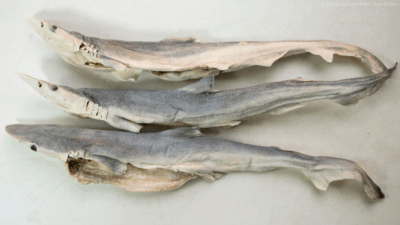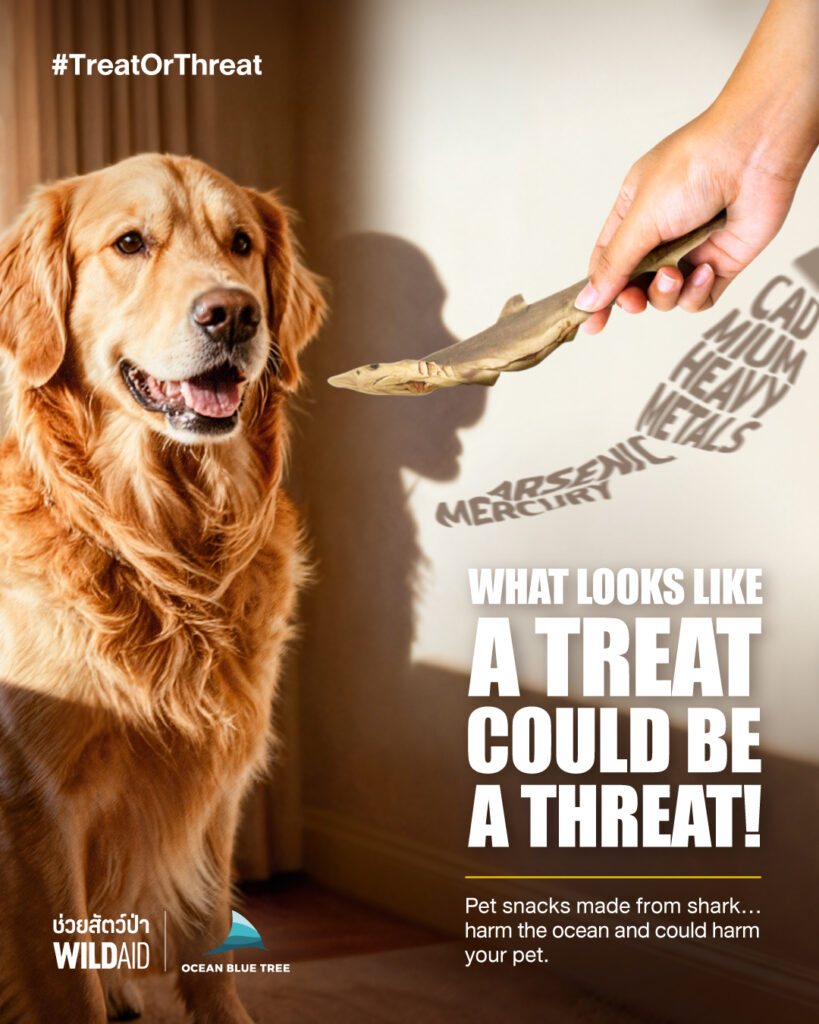
A new toxicology study conducted in Thailand has revealed that certain shark-based pet dental treats may contain potentially unsafe levels of arsenic, raising concerns about long-term health risks for pets. The research, conducted by researchers from King Mongkut’s Institute of Technology Ladkrabang (KMITL) in collaboration with WildAid and Ocean Blue Tree, found that whole dried sharks, often marketed as beneficial for dogs’ oral, joint, and bone health, contained arsenic concentrations exceeding safety limits. The findings also highlight ongoing concerns about labeling transparency and traceability, as many shark-based products are sold under generic terms like “fish cartilage” or “fish bone,” leaving consumers unaware of what they’re actually buying.
Shark-based pet dental chews for dogs and cats, often marketed for their perceived health benefits, have seen a quiet but steady increase in Thailand’s rapidly growing pet industry. These products are often marketed as having the presence of protein, calcium, and other nutrients that support bone, teeth, and joint health. To evaluate the purported health claims, KMITL researchers conducted a toxicological and essential element analysis of 50 samples of cartilage and 12 whole dried shark products. This analysis was part of a project aimed at reducing consumer demand for shark-derived pet treats. The project also includes DNA research to identify the shark species used in these products, with the findings intended to inform future conservation strategies and strengthen trade regulations.
The analysis found that arsenic levels exceeded safe limits in 50 percent of the whole dried shark samples. Previous research has linked arsenic exposure to the development of several diseases in dogs, including myocarditis, dermatitis, and kidney and liver damage. In addition, traces of other heavy metals, such as cadmium and mercury, were detected in both shark cartilage and whole dried shark products, even though their concentrations remained within the maximum tolerable levels (MTL). Prior research cautions that long-term exposure to such metals could lead to adverse health effects, such as kidney damage or neurological impairment.
“Long-term consumption of these products may pose health risks to dogs and cats, due to cumulative effects of metal exposure. As predators at the top of the food chain with long lifespans, sharks are particularly prone to prolonged accumulation of toxic substances,” said Assistant Professor Dr. Wanlada Klangnurak, lead researcher and lecturer at the Faculty of Agriculture Technology, KMITL.
Meanwhile, calcium concentrations in shark cartilage surpassed the maximum nutritional limit for dry dog food. While short-term intake is not immediately harmful, it provides no added health benefits and prolonged excessive intake can lead to issues like hypercalcemia and formation of kidney or bladder stones. More concerning, sodium levels were approximately four times higher than the recommended level for both dry dog and cat food, which may lead to long-term health issues, particularly those with pre-existing conditions such as kidney disease, hypertension, or cardiac disorders, if consumed regularly.
Thailand’s pet industry is booming, which has led to increased demand for premium and functional pet products, including dental treats.
A survey of 419 pet owners across Bangkok and key provinces, conducted by Suan Dusit Poll of Suan Dusit University, found that the main motivations for purchasing were the perceived beneficial nutrients for pet health (67%) and the belief that purchasing these treats expresses love and care (38%). However, concerns about product safety and sustainability are likely to influence future purchasing decisions. Knowledge of the ecological impacts of shark-derived ingredients remains limited, highlighting the need for greater public education, particularly among dog owners.


In recent years, WildAid has observed an emerging and worrying trend of shark-based pet snacks. Our initial online market investigation in January 2024 found over 10 different types of dog and cat treats made from sharks being sold by more than 100 online retailers. By mid-2024, we observed that many vendors no longer advertise these products as ‘sharks’; instead, they branded the products as fish cartilage or bone. This new marketing tactic is concerning as consumers may unknowingly purchase items made from sharks due to less transparent labeling.
Globally, more than 80 million sharks are killed each year due to overfishing and the demand for their parts. Of these, around 25 million (approximately one-third) belong to species at risk of extinction.
A separate study conducted by P.I.Y.A. Research, consistenting of interviews with 50 pet product sellers, revealed a widespread lack of awareness regarding the species used, their sources, and production processes. Most sellers believed these products were merely by-products of the seafood processing industry.
“Many people assume these products are simply by-products of existing fisheries and believe that using every part of the animal is a more sustainable choice. But this is a misconception. In an age when over one-third of all shark species are at risk of extinction, ‘full utilization’ does not equate to sustainable use. They create new demand, disincentivize efforts to reduce shark bycatch, and risk turning waste into a commercial incentive,” said Dr. Petch Manopawitr, Conservation Scientist and Advisor to WildAid.
WildAid’s internal research and interviews with pet product traders confirmed that the majority of these products lack species-specific labeling and traceability. Supporting such products, even unintentionally, risks sending the wrong message in a time of escalating ecological crisis.
The most responsible choice for consumers is to avoid any shark-derived products altogether and to pay close attention to labels.
Sharks play a vital role in maintaining healthy marine ecosystems. As key predators, they help control prey populations, keep ecosystems balanced, and promote overall biodiversity.
In response to the findings, WildAid, in collaboration with Ocean Blue Tree, is launching a campaign to raise awareness about the risks that shark-based products pose to both pets and shark populations in an effort to curb consumption. We are committed to working with government agencies to strengthen trade monitoring and traceability of these products.
Note: the full study will be published mid-December — stay tuned!
Stay in touch and get the latest WildAid updates.
SIGN UP
